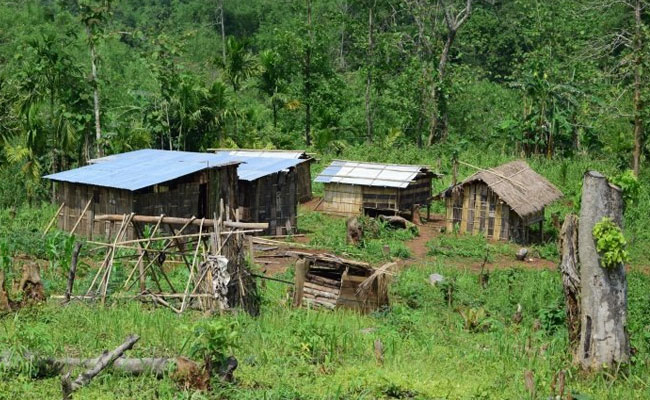Nalbari (PTI): A village in Assam's Nalbari district, which had the road leading to it inaugurated by a former chief minister many years ago, is now almost deserted barring a single family.
From being a prosperous village in the last century to just 16 people in the 2011 census, No 2 Bardhanara village currently has a single family with five members, due to lack of a proper road.
Bimal Deka, his wife Anima and their three children Naren, Dipali and Seuti are the only dwellers of this village in Ghograpara circle, around 12 km from the headquarters town Nalbari.
"We have to travel 2 km through water and muddy paths to reach the nearest motorable road to attend our school and college. During monsoons, we commute through a country boat," Dipali said.
Anima rows the boat to ferry her children back and forth, but despite such tough conditions, the family has ensured proper education for all three.
While Dipali and Naren are graduates, Seuti is doing her higher secondary.
With no electricity, the children study under the light of kerosene lamps. The boat becomes the sole mode of transportation for the family when it rains as all the paths within the village get submerged.
The condition of this revenue village spread across 162 hectares was not so pathetic till a few decades ago, people of nearby areas claimed.
Known for high agricultural yield, former chief minister Bishnuram Medhi had visited No 2 Bardhanara a few decades ago to inaugurate a road leading to the village.
Anima said the apathy of local authorities has worsened the condition, which led villagers to abandon it.
"Local agencies like the Zilla parishad, gaon panchayat or the block development office are not interested in carrying out any work here," she claimed, adding agriculture and animal rearing is their mainstay.
With an NGO, Gramya Vikash Mancha, recently setting up an agricultural farm in the village, the family now gets to interact with other people more often.
Farm's chairman Prithi Bhusan Deka said the village was once prosperous, but recurring floods have deserted it.
"If the government constructs a road and provides basic amenities, the agricultural potential can again be realised and people will return to the village," he added.
Let the Truth be known. If you read VB and like VB, please be a VB Supporter and Help us deliver the Truth to one and all.
Panaji (PTI): As part of a crackdown against tourist establishments violating laws and safety norms in the aftermath of the Arpora fire tragedy, Goa authorities on Saturday sealed a renowned club at Vagator and revoked the fire department NOC of another club.
Cafe CO2 Goa, located on a cliff overlooking the Arabian Sea at Vagator beach in North Goa, was sealed. The move came two days after Goya Club, also in Vagator, was shut down for alleged violations of rules.
Elsewhere, campaigning for local body polls, AAP leader Arvind Kejriwal said the fire incident at Birch by Romeo Lane nightclub at Arpora, which claimed 25 lives on December 6, happened because the BJP government in the state was corrupt.
An inspection of Cafe CO2 Goa by a state government-appointed team revealed that the establishment, with a seating capacity of 250, did not possess a no-objection certificate (NOC) of the Fire and Emergency Services Department. The club, which sits atop Ozrant Cliff, also did not have structural stability, the team found.
The Fire and Emergency Services on Saturday also revoked the NOC issued to Diaz Pool Club and Bar at Anjuna as the fire extinguishers installed in the establishment were found to be inadequate, said divisional fire officer Shripad Gawas.
A notice was issued to Nitin Wadhwa, the partner of the club, he said in the order.
Campaigning at Chimbel village near Panaji in support of his party's Zilla Panchayat election candidate, Aam Aadmi Party leader Kejriwal said the nightclub fire at Arpora happened because of the "corruption of the Pramod Sawant-led state government."
"Why this fire incident happened? I read in the newspapers that the nightclub had no occupancy certificate, no building licence, no excise licence, no construction licence or trade licence. The entire club was illegal but still it was going on," he said.
"How could it go on? Couldn't Pramod Sawant or anyone else see it? I was told that hafta (bribe) was being paid," the former Delhi chief minister said.
A person can not work without bribing officials in the coastal state, Kejriwal said, alleging that officers, MLAs and even ministers are accepting bribes.





